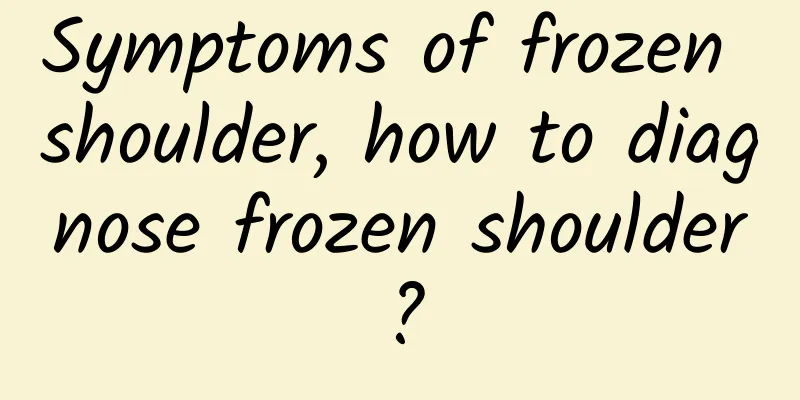Symptoms of frozen shoulder, how to diagnose frozen shoulder?

|
The most common symptom of patients with periarthritis of the shoulder is shoulder pain, which is also accompanied by limited shoulder movement. Moreover, most people who suffer from periarthritis of the shoulder are more afraid of cold and are more likely to suffer from muscle spasms and muscle atrophy. 1. Shoulder pain At first, the shoulder pain is paroxysmal, most of which are chronic. Later, the pain gradually intensifies or becomes dull, or knife-like, and is continuous. Climate change or fatigue often aggravates the pain. The pain can spread to the neck and upper limbs (especially the elbows). When the shoulder is accidentally collided or pulled, it often causes tearing pain. Shoulder pain is lighter during the day and heavier at night, which is a major feature of this disease. If the pain is caused by cold, the patient will be particularly sensitive to climate change. 2. Limited shoulder joint movement The movement of the shoulder joint in all directions may be restricted, and it is more obvious in abduction, elevation, internal rotation and external rotation. As the disease progresses, long-term disuse causes adhesion of the joint capsule and soft tissues around the shoulder, and the muscle strength gradually decreases. In addition, the coracohumeral ligament is fixed in a shortened internal rotation position, which restricts the active and passive movement of the shoulder joint in all directions. Actions such as combing the hair, dressing, washing the face, and putting hands on the waist are difficult to complete. In severe cases, the function of the elbow joint may also be affected. When the elbow is flexed, the hand cannot touch the shoulder on the same side, especially when the arm is extended backward, the elbow flexion cannot be completed. 3. Fear of cold Patients are afraid of cold shoulders, and many of them wrap their shoulders with cotton pads all year round. Even in summer, they dare not let the wind blow on their shoulders. 4. Tenderness Most patients can feel obvious tenderness points around the shoulder joint, which are mostly located in the tendon groove of the long head of the biceps brachii, the subacromial bursa, the coracoid process, the attachment point of the supraspinatus muscle, etc. 5. Muscle spasms and atrophy In the early stage, the deltoid muscle, supraspinatus muscle and other muscles around the shoulder may experience spasm, and in the late stage, disuse muscle atrophy may occur, with typical symptoms such as acromion protrusion, difficulty in lifting, and inability to extend backward. At this time, the pain symptoms are actually alleviated. |
<<: What causes peeling of the soles of the feet? Six factors cause this phenomenon
>>: What is the reason for yellow soles of feet? The inducing factors tell you
Recommend
How long does it take for the placenta to leave the body?
The placenta can be simply described as a contain...
What is the disease that causes leg pain due to back pain
Maintaining a good body shape is beneficial to ph...
Palpitations, shortness of breath, insufficient qi and blood, need to be regulated in time
Insufficient Qi and blood is a sign of sub-health...
What to do if you have stomach pain the day after a painless abortion
In life, many women choose painless abortion due ...
Can I get vaccinated if I have eczema on my face?
Vaccination has become a very common thing. Every...
What are the effects of soaking your feet in mugwort leaves?
Since ancient times, there has been a saying in C...
What causes heel pain?
Heel pain is a common condition that is often cau...
What are the symptoms of frequent sweating on the head?
Regardless of whether the weather is hot or not, ...
Can patients with myocardial ischemia have sex?
Patients with myocardial ischemia can have an app...
The best treatment for lymph node leakage
The best treatment for lymph leakage is generally...
What to do if your child has bad breath due to indigestion
For young children, their intestinal development ...
Is knee pain caused by calcium deficiency?
Knee pain is not necessarily caused by calcium de...
How long does bleeding from threatened miscarriage usually last?
Threatened abortion is the last thing pregnant wo...
Drinking senna for 10 years
Senna leaves have a very good laxative effect and...
What can't you eat if you have cerebral infarction?
What are the things you need to pay attention to ...









